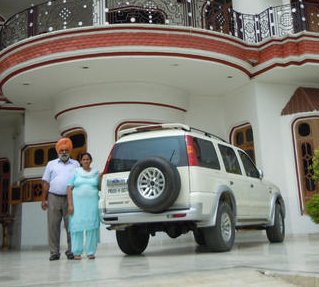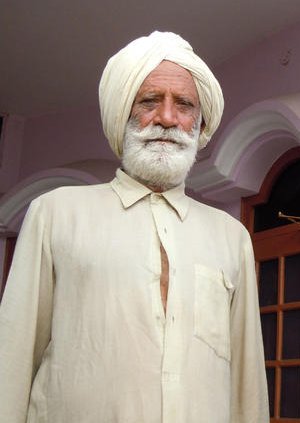 |
| AARON HARRIS/FOR THE TORONTO STAR |
| Kuldeep Singh Dhaliwal, left, Kirandeep Singh Grewal, and Harinderpal Singh Sidhu are all from neighbouring villages in Punjab. They arrived in Canada within days of each other and are all studying at Humber |
PUNJAB, INDIA— When you walk into the village of Littan, population 1,500, you are immediately struck by what you don’t see.
There are no young men in the narrow, dusty streets.
None hanging out in the village square, laughing, playing games and poking fun at each other, none sloshing in water at the reservoir on the edge of the lush rice fields.
No young men anywhere.
It is the same story in the smaller neighbouring village of Khasan. And in Gilljian, a larger village of 250 families, about 15 kilometres down the road.
And in dozens upon dozens of villages in Punjab’s Doaba region.
Punjab is the wealthiest state in India, and many of its families have the resources to send their sons abroad for education and, they hope, a better future. Doaba is particularly affluent because its young men have been going abroad for more than a century, and they’ve been sending money back.
The men have moved away to the U.S., Australia, Europe and Canada as students, temporary workers or simply new immigrants in search of a better life. They’ve live in cramped basements or high-rise apartments while struggling to build a life thousands of miles away.
Few ever return for good.
Left behind are villages bereft of an entire generation of young men, villages where women now fear walking the streets at night because they don’t have male protection, and where seniors fend for themselves in large mansions, hoping to see their children once more before they die.
“Sometimes villages look spooky at night,” says Avtar Mand, a local official in Phagwara, a dusty town a two hours’ drive from Chandigarh, the capital city of Punjab. “You know, there’s just no one there.”
This exodus started in the 1880s, when emigration from Punjab was believed to have started.
Sikh soldiers with the British army travelled to other countries to fight wars, and some never returned. Those who came back told villagers about the places they had seen. Inspired by stories of these far-off countries, people from the Doaba region, where land holdings have traditionally been small, took arduous sea journeys to search for greater opportunity.
In the following decades, young men and families continued to leave as the dilemma of small land holdings — which had to be shared by growing numbers of people as families expanded over generations — persisted.
But villages were never cleared out as they are now. Typically in the past, if one son left, the other stayed back. But a lack of jobs and the country’s increasing corruption is forcing more men to leave.
“They don’t find work and if they do, they can’t afford to pay the bribes (required to land jobs),” says Balwant Ramoowalia, a former federal minister who now runs a regional political party called Lok Bhalai. “Young men have never had it so hard.”
Many families have relatives abroad and the next natural step is to go away, even if it means really far away, to build a new life, says Ramoowalia.
“It’s a sad situation.”
The big, lime-coloured house sits at the edge of Kesarpur village, between rolling fields and dozens of other dwellings, just as large. Two maple leafs, in hot pink, are painted on the inner wall, next to a Union Jack.
Resham Singh, a wiry man in his 80s, lives alone in the seven-bedroom, four-bathroom house. He sleeps on a cot in the courtyard and cooks in a corner of the kitchen.
His older son is in England while two younger sons live in Canada. His wife died nine years ago. “I don’t want to go anywhere . . . what will I do there?” says Singh as he splashes water on a buffalo, one of the two he owns.
Singh’s older son left 26 years ago, the younger ones shortly after. They returned temporarily to build the house.
Down the street — dusty, narrow and unpaved — there are at least five other houses where older couples live alone. Young men from this village now live in North America, Europe and Australia.
At night the streets are empty, and all you can hear are howling dogs.
It could be any village in Doaba.
“The younger boys look at all this and of course, they all want to go abroad,” says Gurdaawar Singh, head of Kesarpur village.
When someone visits from overseas, they are swarmed by children asking dozens of questions about life outside India, says Gurdaawar Singh. “Can’t blame them. There are few jobs around here even if you are well-educated.”
Some boys start planning their escape as soon as they turn 13.
Paramraj Singh is 16 and in Grade 10 and dreams of going to Canada, where two of his cousins live. “I want to study there,” says the lanky young man. His classmate and close friend Gurpreet Singh nods in agreement.
Studying abroad has become the new surefire way for men to escape.
Traditionally, Indians have immigrated to Canada under the points system for skilled workers or the family reunification program. Now, hundreds of young people, from villages and cities, are immigrating as students.
Achieving a specific level in the International English Language Testing System is mandatory for admission to any Canadian college or university. There are now hundreds of language schools in Punjab, many in the Doaba region and some in villages, to prepare students.
Parents happily pay for the coaching but it is only when their sons are gone that they realize that they have lost them, says Gurdaawar Singh.
“The pain comes later.”
 |
| Raveena Aulakh/Toronto Star |
| Karam Singh of Bir village hasn't seen his only son Mandeep for 12 years -- the son has been living illegally in England. |
“Both of my sons live thousands of kilometres away . . . yes, it hurts,” she says, her voice cracking. “I see them once every few years.”
Harbhajan, 54, and her husband, Jasbir, 56, live in a two-storey, five-bedroom house in Littan, which is about 20 kilometres from Jalandhar, Doaba’s largest city.
Their older son, Hardev, 28, has lived in England for a decade, and Harpreet, 25, moved to Toronto three years ago to study business at Humber College. After graduating he started driving a truck and applied for permanent residence.
“We are happy for them but our lives are empty,” says Jasbir, who owns a farm where he grows wheat and rice. “We built this house so that the entire family, including the grandchildren, could live together.”
The Cheemas have been to England and liked being there but, like many other older couples, were unable to settle down.
In Littan, the two are comfortable in familiar surroundings. But they have other concerns.
Punjab, an agricultural state, is the largest producer of wheat in India. Migrants from Bihar and Uttar Pradesh, two impoverished states in east and central India, have always sought work in Punjab. But ever-increasing emigration from villages in Punjab has meant more and more outside workers.
There is tension between locals and the migrants. Locals are convinced that impoverished migrants are responsible for crime. The migrants complain of prejudice, and there have been attacks against them.
There have been no thefts or break-ins in his village, but Jasbir has put double locks on his doors and he says he and his wife are thinking of getting a watchdog, a German shepherd.
Villagers will candidly chat about the emotional impact of immigration, but some aspects are taboo.
Like what happened at Gilljian, a large, prosperous village an hour’s drive from Jalandhar.
Two young girls eloped with migrant labourers about a year ago, triggering a ban on male outsiders entering the village after dark.
In India, where the caste system is still deeply rooted, the incident became a scandal and was the topic of conversation in the region for weeks.
But no one will still talk about it on the record at Gilljian.
“You have to understand . . . we could have lost more girls,” says a senior who has lived in the community for more than 50 years.
Migrant labourers still farm the acres of fields around the village, but villagers keep “an eye on them,” says the elder.
The mass immigration of men has also upset the balance between upper and lower castes in villages, says Avtar Mand, a local official in Phagwara.
Most of the men who have gone away belong to the upper castes — land owners and merchants. The ones left behind are from lower castes, mainly labourers who work on others’ farms.
“Let’s face it — casteism still exists, but there’s no equilibrium any longer in some areas,” says Mand.
“That’s dangerous,” he declares, referring mainly to the prospect of females marrying beneath their caste.
Another taboo subject involves men who have illegally gone to other countries and are unable to return. Some have been gone for a few years, others for decades, leaving behind parents, wives and children.
Every village has one such story, although few will tell it.
Karam Singh’s voice drops to a whisper when he talks about his son. “We haven’t seen him in 12 years,” he says, sighing.
Singh lives in Bir village, surrounded by lush rice fields and eucalyptus trees. His older son, Mandeep, went to England in 1998. No one knows how he got there, but everyone knows he hasn’t been able to return.
Mandeep’s older son was three and the younger one a few months old when their father left. Today, they are taller than their grandfather. Mandeep’s wife was a young, carefree mother then; now, she’s a careworn single parent.
 |
| Raveena Aulakh/Toronto Star |
| Karam Singh of Bir village hasn't seen his only son Mandeep for 12 years -- the son has been living illegally in England. |
Singh is stoic.
“My son wants to have legal status there but hasn’t been able to,” he says in Punjabi. “He says he doesn’t know how he’ll support his family if he comes back. He’s at least sending money home.”
Money has never been an issue, but it is tough on the family, especially his daughter-in-law, Singh acknowledges. There’s pain in her eyes and she’s always tired but never complains, he says.
And now Singh worries that his grandsons, too, will want to leave. He will let them go, he says, but only if they go legally.
“Not to be able to see them, too . . . that would finally kill me.”
While parents yearn to see their children, their sons live with the guilt that they let them down.
Kirandeep Grewal, 23, came to Canada less than eight months ago and is trying to save money so he can go home to see his parents, Avtar and Lakhvir Grewal.
“It feels weird not to see them every day,” says Grewal, a student at Humber College.
Last March. Avtar had to go into hospital because the batteries in his pacemaker were almost dead. The parents decided not to tell Kirandeep, says Lakhvir, “he had just left for Toronto and we didn’t want him to leave everything and come back.”
But Kirandeep learned about his father’s situation from a friend and became very distraught, almost returning home. “I’m still not sure if this, being here in Canada, is a good idea,” he says.
An electrical engineer in India, he graduated with honours but couldn’t find a job for 18 months. Two friends went through the same experience.
They saw only one solution. The three friends, all from neighbouring villages in Punjab, arrived in Canada within days of each other and are all studying at Humber.
Now they are also each other’s family, living together in an apartment near Morning Star Dr. and Airport Rd. “None of us had ever been even abroad for a vacation,” says Grewal. “Being together makes everything less intimidating.”
He sees the irony in their situation. “Yes, there are few men in some villages, and we bunk here together.”
A few kilometres away, near Pearson International Airport, Harpreet Cheema, 23, lives with two roommates. One drives a truck; the other attends Humber College.
They are all from a cluster of villages in Doaba region.
Tall and dark, with a deep voice, he cuts an imposing figure. But when he talks about his parents, especially his mother, there’s a catch in his voice. “You think I don’t feel guilty that they live alone in a huge house,” he asks. “That they have two sons, both whom live thousands of kilometres away . . . too far if they need us in an emergency.”
He calls them every other day and tries to stay on top of everything happening in their lives and in the village. “I miss them but let’s be honest . . . what would I have done if I’d stayed there.”
